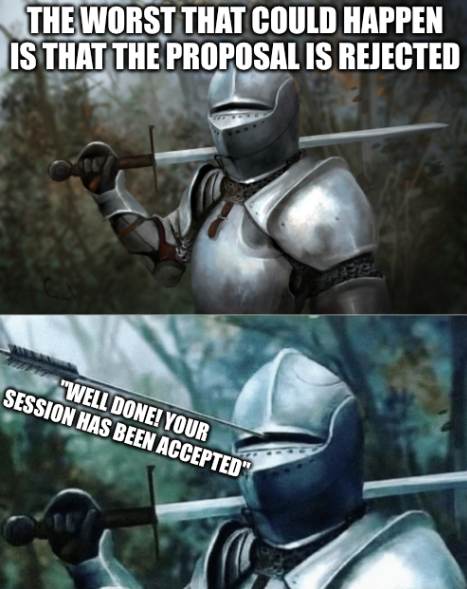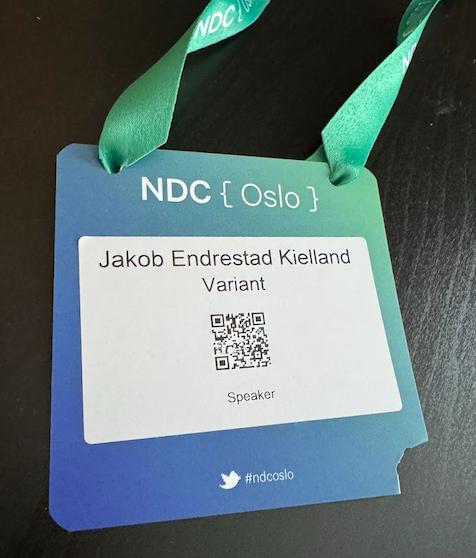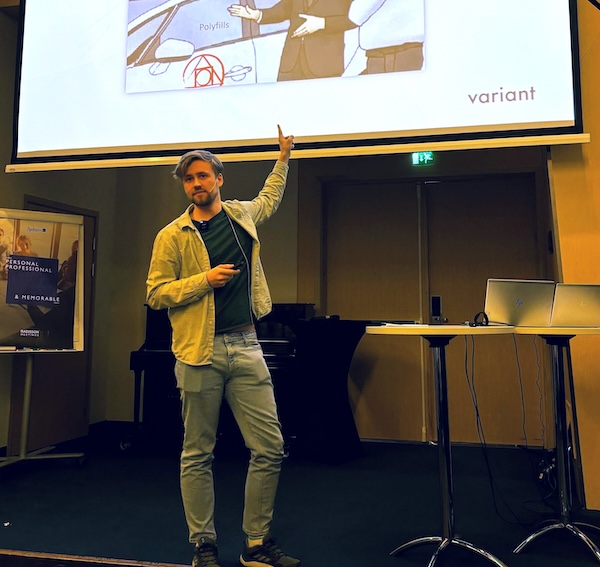Read this blog post in Norwegian here.
This year I spoke at a conference for the first time. This is the story of how I survived that experience.
Ok, well, by the time I’m writing this blog post I’ve technically spoken twice (at Booster and NDC Oslo), but I’ve decided to combine them as a sort of frankenexperience. I held the same talk at both conferences, after all.

One of the coolest things you can see in your inbox on your way to work
I still clearly remember how it felt to open Outlook and see that NDC had sent me an email beginning with the words “Well done!”. I was sitting on the bus, was more than a little tired, and had to read the email a few times to make sure I wasn’t misunderstanding. It’s hard to convey how certain I had felt that my lightning talk would be rejected, but to put it this way, I definitely didn’t have NDC’s dates marked in my calendar. The main reason I had submitted a lightning talk was actually to practice making a title and abstract for future Call for Proposals (CFPs), not because I thought I had any sort of realistic shot at being accepted. And here I was, having suddenly been given a chance to speak at Norway’s biggest developer conference. Holy shit.
After the dopamine rush had subsided (because it really did last for quite a while), I was hit by yet another holy shit-moment; I need to make sure this talk is good enough that people with tickets worth hundreds of dollars aren’t disappointed.

I was well-prepared for having my proposal rejected. The same can not be said about having it accepted.
It was definitely helpful to have tried my hand at speaking internally at work. That experience gave me a sort of guarantee that I at the very least could accomplish something passable, and since the talk I submitted was one I had held for my colleagues already I assumed I would be able to save quite a bit of prep time. I made a plan for how to make sure my preparation would be stress-free: I would start early, finish my slides weeks before the conference and therefore guarantee that I would have enough time to practice.
That of course didn’t happen, which really is the least surprising thing in the world. As I mentioned, the plan was to reuse my existing slides so I could avoid spending half an eternity making new ones. Obviously I remade every single slide entirely, as I ended up finding all sorts of things I didn’t like about my examples, animations and phrases. Besides, I had to make them in powerpoint-format seeing as it was a requirement from Booster (and because my Keynote files didn’t automatically convert nearly as well as you’d expect).
So I ended up spending more time than planned, finished later than I planned, and was pretty damn stressed when I tried the full talk for the first time and saw 16 minutes on my stopwatch. I needed to somehow cut 6 minutes! I’m gonna be honest, that made me panic a little bit. Under a week remained before I would be on stage, and the mental image of having my microphone audio cut due to time concerns wasn’t exactly tempting.
Okay… Deep breaths Jakob.
After a few more repetitions I was down to 13 minutes, and with the help of some ruthless trimming of my content I barely managed to hit 10 minutes a few days before the conference.
The most useful preparation tip I received was from my colleague Simen: He recommended I record my practice runs and listen back to them afterwards. It’s pretty damn awkward, but it’s an unbelievably good way to improve a talk. Being forced to listen to my clumsy phrasing made me automatically start working on improvements, and the next time I did a practice run the difference was very noticeable. I repeated this process many times, until I was left with a result I thought was pretty good.
Moment of truth. One sleeper train later, with sleep that at best could be described as “almost passable”, I stepped into Oslo Spektrum (a venue which has previously hosted Eurovision, among other things). I would be lying if I said I didn’t find it pretty dang cool to be given a conference badge with the “speaker” role. I would also be lying if I said I didn’t keep the badge afterwards.

Receiving this was so cool that I still haven’t thrown it away
It’s pretty difficult to relax and enjoy a conference when you’re still waiting on your speaking slot, and I’d guess my heart rate averaged around 25% higher the day before my slot compared to the day after. I obviously spent the evening practicing my talk, if nothing else in the hope it would calm my nerves. When it comes to calming down there’s nothing quite like walking around the room while babbling to myself like a maniac.
I show up for my session with plenty of time to spare, get set up with a microphone, check that the technical stuff is working, and sit down on the first row. I’m not exactly giving my full focus to the talks preceding mine, and as I’m sitting there, mentally repeating my talking points, it’s suddenly my turn. I walk onto the stage, put my laptop down, and do as much as I can to avoid the dreaded nervous hand jitters (tip: holding something, such as a presentation remote or laser pointer helps a lot).
I’ve previously experienced that something remarkable happens the moment I start speaking. Suddenly my focus shifts to the task of communicating something, and I kind of don’t have time to feel nervous anymore. It’s a pretty cool feeling, a sort of super-flow, and when you manage to add a dramatic pause here and some intonation for emphasis there it’s an incredible rush. I’ve previously seen it compared to the feeling you get from extreme sports, and as someone who has never in my life done an extreme sport I definitely agree.
Suddenly, I’m at my favorite part of the whole talk — a section where I tell the participants to raise their hands (yay, audience participation!) and follow up with a joke that’s historically turned out to be at least slightly funny. I hear the rumble of laughter spread through the audience, and realize that this has gone well. The audience is comfortable enough to laugh at my terrible joke, which means that my job here is effectively done.
A couple of times I notice that my train of thought slips because of short lapses of concentration. This could’ve potentially been really uncomfortable for me and very noticeable for the audience, but since I’ve practiced the talk so damn much I automatically continue speaking long enough that my train of thought returns. There’s an expression that’s fairly fitting for this sort of situation: “You don’t rise to the occasion, you sink to your level of preparation” (there are many variants of this in all sorts of different industries — I first heard it from a pilot). Being this comfortable with a talk is a great feeling, and to achieve it I need to practice well past the point where it becomes boring.

What is the point of a lightning talk be if the speaker doesn’t dramatically point to a meme at least once?
Suddenly I’m done, and I can sit down and enjoy 55% less shoulder tension and the fact that I’ve just goddamn delivered a talk to people who have paid to be here — how cool is that!? (Ok fine, most of them had their employer pay for the ticket, but still.)
Trying my hand at conference speaking has been really stressful at times, and has cost me maaaany hours in preparation, but it has undoubtedly been worth it. My next goal is to get to hold a longer talk somewhere, and my first submission will probably be NDC London, whose CFP is open at the time of writing. So, dear reader, do you have a feeling that it might be fun to try your hand at speaking? Submit a talk to NDC London, and if we both get lucky we might end up bumping into each other there. Submitting CFPs is good for practice, and besides, the worst that could happen is that our proposals are rejected 😉.
I will also hold the lightning talk this blog post was written about at JavaZone, HelloStavanger and TDC in 2024. Say hi if you see me there!